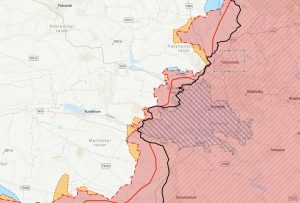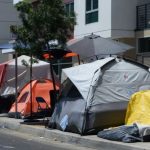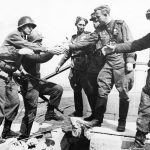From the time that Russian forces invaded Ukraine in February 2022, Western media coverage of the war has been dominated by the perspectives of Ukrainians who support Zelensky’s government and who oppose Russia. While it is vitally important that we be informed of their perspective, we cannot truly understand the Ukraine war without hearing from Ukrainians who reject Zelensky’s rule. In the Western mainstream discourse, those Ukrainians are virtually invisible.
While travelling in Russia this past April, I received a message of support from a Canadian Facebook friend. She explained to me that certain of her family members live in the Donbas, in areas controlled by Russia. She expressed gratitude for my efforts to understand their perspective.
I asked her whether any of her family members from the Donbas might be willing to speak with me. She then put me in contact with one of those family members. His name is Mikhail, and he is now an assistant professor in applied mathematics at a Moscow university.
Mikhail and I arranged to meet one afternoon in Moscow.
Yasynuvata, a settlement in the line of fire
Over lunch, Mikhail explained to me that he was born and raised in southeastern Ukraine, in the town of Yasynuvata. Yasynuvata lies about twenty kilometres to the north of Donetsk. It has a population of approximately 34,000.
Yasynuvata is very close to the front line between Russian and Ukrainian forces and to Avdiivka, a heavily fortified town that is under Ukrainian control.
Since 2014, Donetsk and surrounding villages have been shelled from Avdiivka repeatedly.

Map of southeastern Ukraine, Institute for the Study of War
Mikhail lived in Yasynuvata until 2010. In that year, he entered a program in mathematics at Moscow University, but his father and mother remained in Yasynuvata. His father died two years ago, but his mother and brother continue to live in Yasynuvata. His brother is 36 years old, slightly older than Mikhail.
The last time that Mikhail visited Yasynuvata was in January 2022, shortly before Russian forces invaded Ukraine. He hopes to travel there this summer, but whether he does so will depend on his personal circumstances.
Fighting for independence from Ukraine
Some of Mikhail’s friends have fought at the front line as members of pro-Russian forces. A few of them have been fighting for eight years. A good friend of Mikhail, who is born on the same day as his older brother, recently sent him greetings while on leave from the frontline. Mikhail had friends who died in 2014, when the conflict erupted.
According to Mikhail, Donetsk and Luhansk mounted a “complete mobilization” when Russia’s “Special Military Operation” (SMO) began in February 2022. One teacher from Donetsk whom Mikhail’s mother knew personally was mobilized and later killed by a Ukrainian sniper while he was manning a military post.
Mikhail is persuaded that, when the SMO began, Ukrainian forces were on the verge of invading Donetsk and Luhansk. He explained that, at the beginning of 2022, the line of contact had been relatively quiet for some time. Ukrainian civilians were able to cross the line of contact from pro-Russian territory to Ukrainian-held territory. In early 2022, many of these civilians reported having seen a large build-up of military forces on the Ukrainian side of the contact line. They also claimed to have witnessed the transport by rail of new types of weaponry to the front line – weaponry that Ukrainian forces had not used previously.
As reported by the Organization for Security and Cooperation in Europe, Ukrainian forces greatly intensified their shelling of areas held by pro-Russian forces in mid-February 2022.
Collectively, these ominous developments looked like preparations for a large-scale Ukrainian attack on areas under rebel control.
At that time, Mikhail contemplated leaving his job in Moscow and going to his hometown to take up arms and help protect his family, but when Russia’s government decided to intervene military in February 2022, he opted to continue doing his job in Moscow.
Mikhail wants Donetsk to be part of Russia. So too do his mother and brother.
Not only does Mikhail have immediate family in Yasynuvata, but he also has cousins in Mariupol. He has not seen them since the SMO began.
One of his cousins remained in Mariupol during the battle for control of the city in 2022. He reported to Mikhail that there was a lot of looting during the battle. His cousin, a devout Russian Orthodox Christian, refused to take part in the looting.
Despite the challenging conditions in Mariupol, Mikhail’s cousin remained there with his wife and children. His cousin had business interests in Ukraine. He has lost income due to the war. According to Mikhail, his cousin nevertheless has “no anger toward Russia”. His cousin does not want war, but “likely prefers to be part of Russia”.
Mikhail says that some Russian Orthodox Christians now see Ukraine as a “Satanistic country” due to its destruction of Russian Orthodox churches. His cousin no longer wishes to live in a country that destroys churches.
“I have Ukrainian blood”
Mikhail’s father came from Kostroma, Russia. His maternal grandmother was a Cossack who came from a community on the River Don. His maternal grandfather is ethnically Ukrainian and came from Ukraine. Mikhail said “I have Ukrainian blood.”
When he was being raised, most of the education in Mikhail’s community was in the Russian language. The Ukrainian language became more widely used in the education system when Ukraine became an independent country. Mikhail took a course in Ukrainian history after Ukraine gained independence. He said that he saw first-hand how the education system in Ukraine evolved over the years to the point where students were taught to view Russia negatively.
He recalled an incident involving a sporting event that he attended in his hometown. There were people there chanting for the defeat of athletes whom they viewed as Russian.
When he was young, Mikhail’s mother told him that many Ukrainians did not view him as Ukrainian because Mikhail’s father was from Russia. Mikhail feels that it was wrong that he was viewed this way by fellow Ukrainians. When he talked to me about how he was treated, Mikhail’s eyes welled up, and he needed to gather himself before continuing the conversation.
Is peace possible?
Last year, Russia annexed four oblasts in southeastern Ukraine: Kherson, Zaporizhzhia, Donetsk and Luhansk. Russian forces, however, do not currently control all of those oblasts.
I asked Mikhail about peace. Specifically, did he think it was acceptable for Russia to cede to Ukraine those parts of the four annexed oblasts that Ukraine currently controls?
His answer was that Russia has demanded various conditions to end the war. Those conditions include the demilitarization of Ukraine and a prohibition on foreign military forces in Ukraine. Mikhail believes that, if Ukraine does not accept those conditions, then Russia must continue to fight the war. He expressed scepticism that “Zelensky’s boss” would allow Zelensky to do a peace deal acceptable to Russia. I asked Mikhail to identify “Zelensky’s boss”. Mikhail responded “I don’t know, but it’s probably a leader from the United States or Britain.”
Mikhail then offered the opinion that this war is designed to “destroy Europe”. That is precisely what severing the energy relationship between Russia and Europe will do, he argued. He said that some European factories have already begun the transfer of their operations to the United States due to the increased cost of gas in Europe.
Mikhail added that certain European countries are reliant upon Russian nuclear energy, and now the Americans wish to sever that relationship as well.
According to Mikhail, all of this looks like a project to destroy Europe. He is convinced that the U.S. and British governments will not stop this war until they have achieved that goal.
I asked Mikhail how he expected this war to end. He said he expected that the hostilities will end in Ukraine in one to two years, but that the conflict would shift to other European countries. He believes that the U.S. and British governments will foment conflict there to further weaken Europe.
Mikhail also said that “NATO is likely to dissolve”.
Mikhail mentioned a Russian economist who correctly predicted the financial crisis. That economist now predicts another economic crisis in the United States, but the “main problem for the United States will be China.” Mikhail believes that the China-mediated rapprochement between Saudi Arabia and Iran demonstrates the growing power of China in the world. “Now they must focus on China, and the U.S. does not have sufficient power to fight with China and Russia at the same time.” He is particularly worried about Europe and “our friends” there. He specifically mentioned the Serbians and Greeks, who share the Orthodox faith with Russians.
I asked Mikhail what he would tell people in the West about this war. He answered that people in the West, and especially in Europe, should “make up their own minds”. They must imagine how their daughters and sons will live tomorrow if the West continues down this path. “Everything that you [Westerners] do makes it seem as though you do not want to live tomorrow.”
Life in Russia
I asked Mikhail whether he thinks people in Russia can speak freely about the war and express opposition to the SMO. He said he knows some people who believe that the SMO was a mistake. He said that those people are free to express their views in private conversation. The problem arises when people express such views in large public protests and make claims about the war that are factually incorrect – for example, if they greatly overstate the number of Russian casualties.
Mikhail said that he wants critics of the SMO to know what his family has endured at the hands of Ukrainian forces. His question for these critics is: “do you want Ukrainian forces to kill my mother?”
I asked Mikhail where he stands on the political spectrum. He said he considers himself a “centrist”, but “I am not sure about this.” He considers himself a centrist because he generally believes that the truth lies somewhere between two absolutist positions.
When asked if he thinks that Vladimir Putin is a good President, Mikhail said “it’s very hard to answer this. Probably Russia could have a better President, but when he first came to the Presidency, Putin was probably the best option for the Russian people.” Now, he added, “some new politics grow”, and he hopes someone better than Putin will emerge to replace him. Since 2000, however, Putin was “probably the best candidate” of those candidates who were known to the Russian people. Putin, he concluded, is a “very good” President.
If Mikhail could change one thing about President Putin, it’s that Russia’s President should be harder on traitors. For a lot of Russians, explained Mikhail, Putin is “very very very soft” when it comes to traitors.
Mikhail offered the example of Anatoly Chubais, who now lives in the United States. Immediately prior to the commencement of the SMO, Chubais was an adviser to Putin, but Chubais reportedly resigned when the SMO began. (Chubais is best known for his controversial role in ‘reforming’ Russia’s economy in the 1990s after the fall of the Soviet Union. The raft of privatizations under Boris Yeltsin created a large number of very wealthy oligarchs, while living standards for ordinary Russians plummeted.)
Mikhail added that, right now in Russia, a lot of people think that the Russian government should jail the head of Russia’s Central Bank, Elvira Sakhipzadovna Nabiullina. There is evidence, Mikhail believes, that Nabiullina works to advance the agenda of the IMF and not the interests of the Russian people.
I asked Mikhail if he thinks that it is acceptable for some people in Russia to have billions of dollars in wealth. In reply, Mikhail mentioned the case of Yevgeny Prighozin, the head of the Wagner Private Military Company. According to Mikhail, Russia’s people don’t have a problem with Prighozin’s wealth because he uses it for the good of Russia, but some wealthy Russians do not use their money in the interests of Russia. Mikhail explained that the problem is not the possession of wealth, but how billionaires use it.
I then mentioned the case of Mikhail Khodorkovsky. In the early years of Vladimir Putin’s Presidency, Khodorkovsky was the richest person in Russia and potentially on his way to becoming the wealthiest person in the world, but in 2003, Khodorkovsky was arrested and accused of tax evasion. He was later convicted and spent ten years in prison. The vast majority of his wealth was confiscated by the Russian state.
Mikhail said he is “not a friend” of Khodorkovsky. He explained that, by the last year of Yeltsin’s Presidency, the oligarchs were actually in charge, and Yeltsin was a mere figurehead. When Putin took power, says Mikhail, Putin told the oligarchs that the oligarchs could keep their wealth if they confined their activities to business, but that they could not keep their wealth if they wanted to use their wealth to acquire political power.
Khodorkovsky refused to accept this. Mikhail said that Khodorkovsky could have been like Russian billionaire Roman Abramovitch, but Khodorkovsky wanted both political power and vast wealth. That, said Mikhail, is why Khodorkovsky was divested of his wealth.






Not exactly interviews with moderates, nor with Ukrainians reflecting the more common view. There are also Russians and other foreign nationals fighting alongside Ukraine. Pretty sure they feel strongly about pushing the Russian invaders out and toppling the Putin regime
Dimitri is sharing opinions our MSM doesn’t report. We should be grateful
Mr. Lascaris, thank you for the interesting and informative article. Articles such as this are notably missing from MSM reporting and analysis. Please keep up the valuable work.